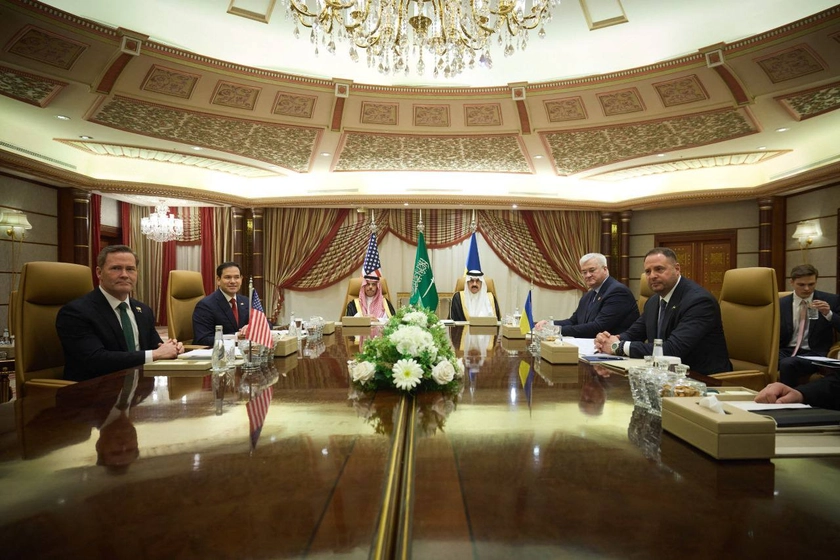What parallels are there, and lessons to be learned, from Azerbaijan’s demining efforts resulting from it wars with Armenia, and Ukraine’s current predicament? This was the topic of a an international meeting recently held in Germany.
Let’s recall that as a result of the barbaric Russian full-scale invasion, Ukraine has become the world's most landmine-polluted region. According to analysis by the international think tank GLOBSEC, Ukraine now is the unwilling host of the largest mined area in the world. Almost a third of Ukraine's territory, some 160,000 square kilometers, has been affected by the fighting and will potentially require to be de-mined, a process which could take over 50 years.
JOIN US ON TELEGRAM
Follow our coverage of the war on the @Kyivpost_official.
The occupying Russian army has significantly increased the size of that problem and the threat it presents, by blowing up the dam at the Kakhovskaya hydroelectric power station (HPP). The resulting flood, has dislodged thousands of the anti-personnel and anti-tank mines that Russian forces had planted around the power station and the defensive positions it sited along the occupied parts of the Dnipro River. As the floodwater moves, so these mines have started to drift with it.
These mines now pose a potentially great danger to the civilians in those areas now affected by the overflowing water. As mines move, they may be deposited in previously cleared areas where they are likely to be covered by mud and silt that has also been moved. This will makes those mines that much harder to detect and dispose of which could have a catastrophic impact on the civilian population. The Red Cross and Care International have warned that “Russian field ammunition depots were located in the 5-15 km strip [along the river] that was flooded. All of this [has been] spread by the flood zone and may pose a danger," said Natalia Humeniuk, spokesperson for the Ukrainian South military command.

Teen Bombers in Ukraine: Recruited, Used, and Eliminated by Russian Special Services
The threat of Russian-made landmines to the civilian population was the topic of an international conference called “Bonded by Pain” in Berlin on May 31. It was organized by Azerbaijani communities in Ukraine with the main focus of discussion being the legal, psychological and medical situation faced by victims of landmines in Ukraine and Azerbaijan.
Participants at the conference highlighted the fact that Azerbaijan is the only one of Ukraine’s partner nations faced by a similar tragedy. Armenian forces, supported by Moscow, continue to plant mines in and around Azeri-controlled territory in Nagorno-Karabakh using cover provided by so-called Russian “peacekeepers”.
For the past 30 years, Azerbaijan has suffered from severe landmine-contamination. The disputed region of Nagorno-Karabakh came under the control of Azerbaijan in 2020 after having been occupied for three decades by Armenian forces. The affected areas are still being de-mined, and exactly like in Ukraine, it will take decades to free it from these “seeds of death.”
The landmines, which were and are being planted in Ukraine and Nagorno-Karabakh, are identical as they are produced from Russian designs. Armenia is still producing landmines in the «Electron» factory in Yerevan, which is part of the Russian military-industrial complex.
The tactics for laying landmines in Ukraine and Nagorno-Karabakh are also identical as they are based on Russian doctrine and training. Armenian forces have been using mines as booby traps laid before retreating and abandoning their positions. In much the same way, as the Russians did before they fled from Bucha, Irpen, and other occupied communities in the Kyiv region.
Armenians have laid mines and booby traps under the floors, behind doors, and in the courtyards of residential structures, schools, parks, and even cemeteries. Azerbaijan's State Agency for Mine Clearance ANAMA recently reported the discovery of a mass grave in Nagorno-Karabakh that had been filled with mines by Armenian forces with the apparent aim of harming those looking for the remains of their loved ones.
During the podium discussion at the conference in Berlin, the use by Russia and Armenia of landmines as a terror weapon was characterized by specialists as a form of genocide.
“Originally and in conventional warfare modern antipersonnel mines are supposed to be used by soldiers against soldiers, not against civilians — it’s unconventional warfare. Hidden in small toys, like it’s done in both Karabakh and Ukraine by Armenian or Russian soldiers. Hidden in cemeteries where people come to respect their dead. Hidden even in people’s own houses. They are placed in such places in order to kill as non-combatants, and civilians.
It’s an act of genocide because again, by definition they are trying to destroy non-combatants because of their ethnic or national identity”, Dr Sophia Tkazky, lecturer in Forensic Psychology, University of Derby, Assistant Editor of the Journal of Investigative Psychology and Offender Profiling, stated.
She noted that planting landmines in civilian areas was an old Soviet tactic, inherited by Russia and Armenia. It is intended to make people afraid to return to their homes, within liberated regions after the occupation. "The Russians and their allies continue doing that because it is considered a strategic [way to] harm their enemies," Dr. Tkazky said. She pointed out that this is a part of the dehumanization process when its soldiers are taught to treat civilians as lesser beings.
The conference in Berlin was attended by Ukrainians and Azeris, who have suffered from Russian-made landmines in the Kharkiv region and different areas of Nagorno-Karabakh. A father and his 8-year-old son from Ukraine and three civilian workers from Azerbaijan, who had lost legs because of landmines shared their experiences. They were bonded by the pain and suffering inflicted by the occupying forces, which did not consider them human and turned their homeland into a minefield.
You can also highlight the text and press Ctrl + Enter











